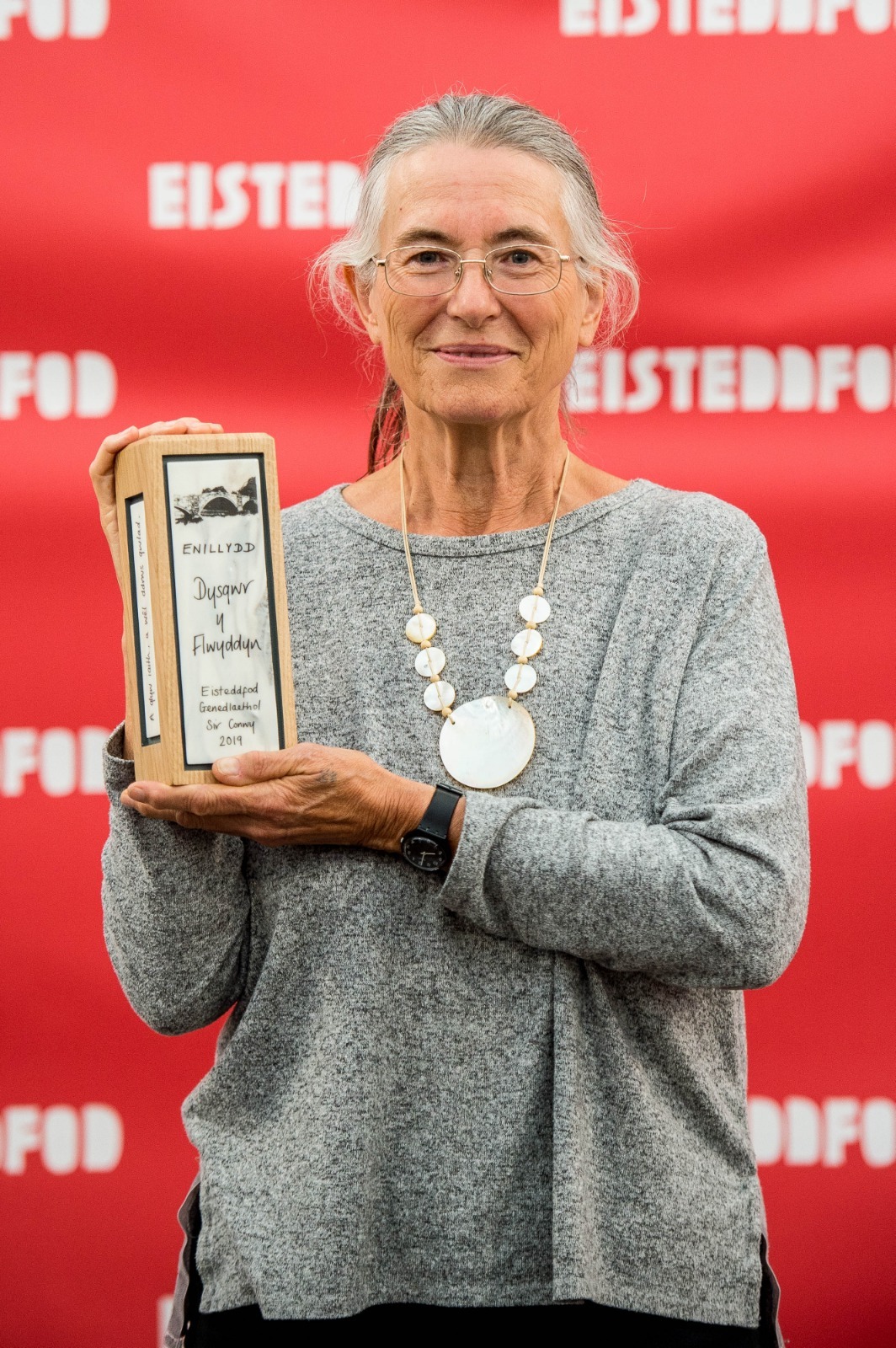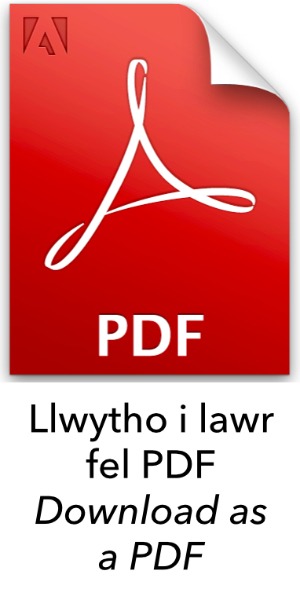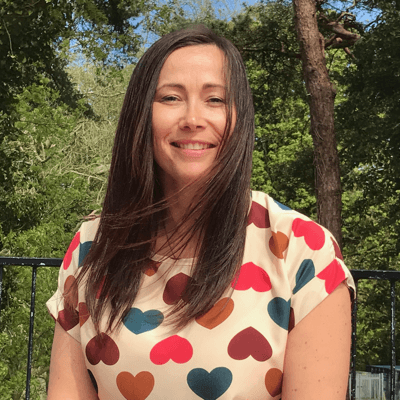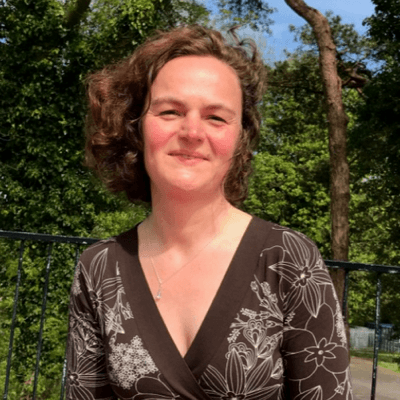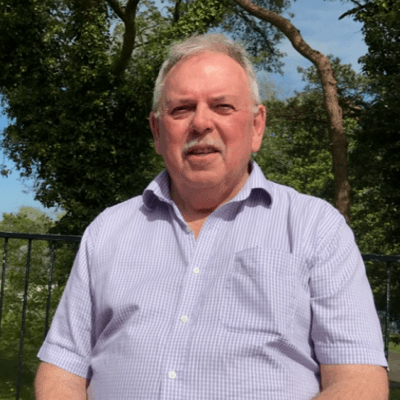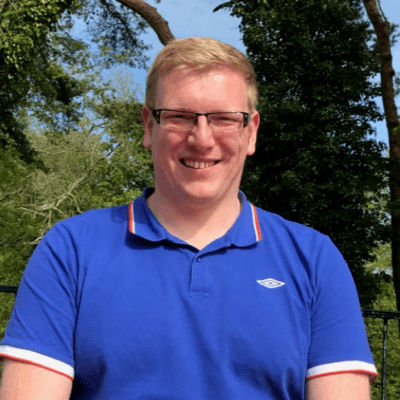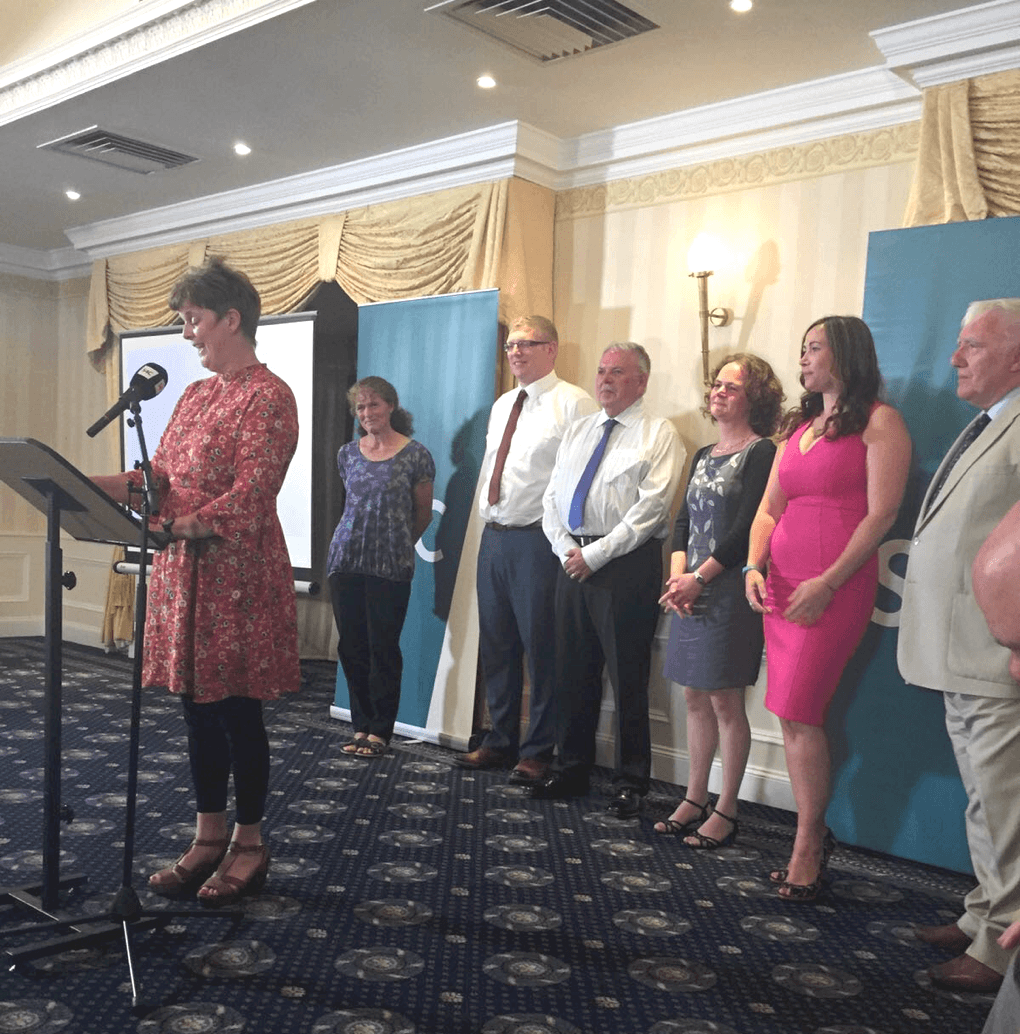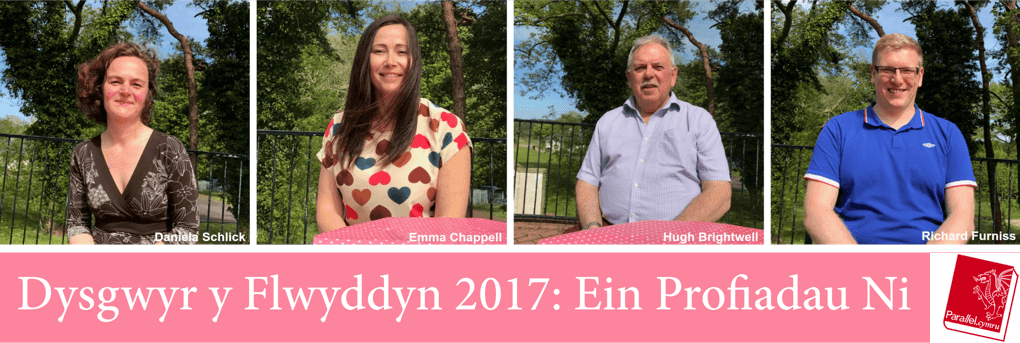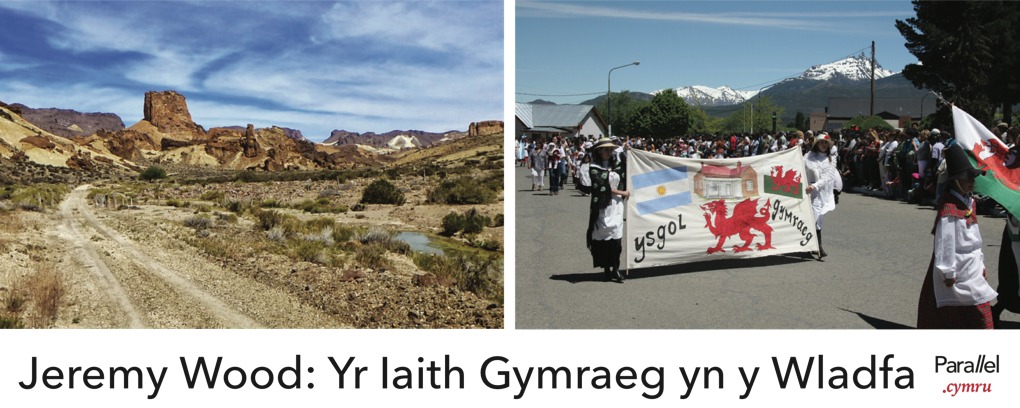‘I’m hopeless at learning languages!’ ‘I’m too stupid to learn another language!’ How many times have you heard this? Very often, probably. But those people are wrong. No one is too stupid to learn another language. There are half a million people in Wales speaking two languages. They are not all Einsteins! What is important is to learn a language in the right way- under the right conditions. Here, Robat Powell, the first Welsh adult learner to win a chair in the National Eisteddfod (Rhyl, 1985) explains more.
| Mae pedwar cam yn y broses o ddysgu iaith arall. Y pedair ‘Ec’, dw i’n eu galw nhw: Cymhelliad – Cyfle – Cyswllt – Cadw ati. Gadewch i ni edrych ar y pedwar cam yma. | There are four steps in the process of learning another language. The four Cs, I call them: Cymhelliad – Cyfle – Cyswllt – Cadw ati. (Motivation – Opportunity – Contact – Perseverance). Let us take a look at these four steps. |
| 1. Cymhelliad. Mae’n rhaid bod rheswm da gyda chi dros ddysgu’r iaith arall. Nid dim ond diddordeb. Efalle eich bod eisie byw mewn gwlad arall. Eisie priodi person sy’n siarad yr iaith. Eisie pasio arholiad. Eisie swydd sy’n gofyn am fedru’r iaith. Ond heb reswm cryf fyddwch chi ond yn chwarae gyda’r iaith yn y pen draw. Y rheswm cryfa i gyd yw eisie dod yn aelod llawn o’r grŵp arall, e.e. dod yn Gymro/Gymraes Gymraeg yn lle aros yn Gymro/Gymraes ddi-Gymraeg. | 1. Motivation. There must be a good reason for you to learn another language. Not just interest. Perhaps you want to live in another country. Want to marry someone who speaks the language. Want to pass an exam. Want a job that requires you to know another language. But without a strong reason you will in the end do no more than play at the language. The strongest reason of all is the wish to become a full member of another group, for example to become a Welsh-speaking person instead of remaining a Welsh person with no Welsh. |
| 2. Cyfle. Rhaid cael cyfle i glywed a gweld yr iaith darged. Cyfle i siarad yr iaith â rhywun arall. Mae mynd i ddosbarth yn help mawr. Ond hefyd mae’n bosib dilyn cwrs yn yr iaith ar-lein neu brynu cwrs sydd â llyfr a CD neu DVD. Y peth mwya pwysig yw cyfle i glywed yr iaith lafar. Y dyddiau hyn mae’r rhyngrwyd yn rhoi cyfle gwych i glywed iaith arall bob dydd. | 2. Opportunity. There must be an opportunity to hear and see the target language. An opportunity to speak the language with someone else. Going to a class is a great help. But it is also possible to follow an online course in the language or buy a course with a book and CD or DVD. The most important thing is to have an opportunity to hear the spoken language. These days the Internet provides an excellent opportunity to hear another language every day. |
| 3. Cyswllt. Mae angen cyswllt â’r iaith lafar a hefyd â’r iaith ysgrifenedig. Cyswllt gyda pherson byw sy orau. Pobol mewn dosbarth neu ffrindiau. Os y’ch chi’n dysgu Ffrangeg yn Ffrainc, e.e., bydd gyda chi gyswllt â siaradwyr o’ch cwmpas chi – yn y siopau, yn y gwaith, ar y bws, ym mhob man. Ond gallwch chi ddysgu’n dda heb gyswllt â phobol. Gallwch wrando ar yr iaith trwy’r rhyngrwyd, y radio, neu ar CD cwrs iaith. Gallwch chi siarad â’ch hunan pan fyddwch chi’n gyrru’r car neu’n aros am y bws. Ond chi sy’n gorfod chwilio am y cyswllt! Fydd siaradwyr yr iaith ddim yn dod atoch chi. | 3. Contact. You need contact to the spoken language and also to the written. Contact with a real person is best. People in a class or friends. If you are learning French in France, for example, you will have contact with speakers around you – in the shops, at work, on the bus, everywhere. But you can learn quite well without contact with people. You can listen to the language on the Internet, on the radio, or on a CD language course. You can talk to yourself when driving the car or waiting for the bus. But it is up to you to look for the contact! Speakers of the language aren't going to come to you. |
| 4. Cadw ati. Dylech chi ddefnyddio’r iaith darged bob dydd, os dim ond darllen am bum munud. Os gwnewch chi hynny, gallwch chi ddysgu pethau sylfaenol iaith newydd yn eitha da mewn rhai misoedd. Ond does neb yn meistroli iaith mewn dau neu dri mis. Mae’n rhaid cadw ati! Mae hynny’n meddwl cadw cyswllt â’r iaith bob dydd am ddwy, tair neu bedair blynedd a mwy. Mewn gwirionedd, dydyn ni byth yn gorffen dysgu iaith, hyd yn oed ein mamiaith. I nesu at safon siaradwr iaith-gynta mae angen tua 1,000 o oriau cyswllt â’r iaith – yn sgwrsio, yn darllen neu’n gwrando arni hi. Os yw’r iaith arall yn defnyddio sgript gwahanol fel Arabeg neu Siapanëeg, bydd angen llawer mwy na 1,000 o oriau i ddysgu ei darllen a’i hysgrifennu, yn ogystal â’i siarad hi. Felly, cadw ati sy’n rhaid! | 4. Perseverance. You should use the target language every day, even if only to read for five minutes. If you do this, you can learn the basics of a new language quite well within a few months. But nobody masters a language in two or three months. You must keep at it! That means keeping in contact with the language every day for two, three or four years or more. In fact, we never finish learning a language, even our mother tongue. To approach the standard of a first-language speaker one needs around 1000 hours of contact to the language – conversing, reading or listening to it. If the other language uses a different script, like Arabic or Japanese, you will need much more than 1000 hours to learn to read and write it, as well as to speak it. So, perseverance is a must! |
Does neb yn meistroli iaith mewn dau neu dri mis; mae’n rhaid cadw ati!
Fy mhrofiad o ddysgu Cymraeg / My experience of learning Welsh
| Roedd y pedwar cam hyn yn glir yn fy hanes fy hunan pan ddechreues i ddysgu Cymraeg yn chwedegau’r 20fed ganrif. Pan es i i Brifysgol Llundain yn ddi-Gymraeg fe glywes i Gymry eraill yno yn siarad yr iaith â’i gilydd. Teimles i’n gryf iawn fod yn rhaid i minnau ddysgu’r iaith i fod yn Gymro cyflawn, a dyna oedd y cymhelliad. | These four steps could clearly be seen in my own story when I began to learn Welsh in the 1960s. When I, having no Welsh, went to London University I heard other Welsh people there speaking the language with one another. I felt very strongly that I had to learn the language to become a complete Welsh person, and that was the motivation. |
| Roedd y cyfle ffurfiol i ddysgu’r iaith yn Llundain yn brin. Doedd dim dosbarthiadau yno. Roedd rhaid i mi greu’r cyfle trwy brynu adnoddau. Rwy’n cofio prynu ‘Teach Yourself Welsh’ gan Bowen a Jones, er mai y llyfrau mwya effeithiol i mi oedd ‘Welsh Made Easy’ gan Caradar. Prynes i’r hen gwrs Linguaphone hefyd – ar recordiau mawr 33rpm! Doedd safon y sain ddim yn uchel, ond roedd y 30 gwers hynny’n help mawr i mi, yn enwedig gartre yng Nglyn Ebwy pan nad oedd neb arall i ymarfer yr iaith gyda nhw. | Formal opportunities to learn the language in London were thin on the ground. There were no classes then. I had to make the opportunity by buying resources. I remember buying 'Teach Yourself Welsh' by Bowen and Jones, although the books I found most effective were 'Welsh Made Easy' by Caradar. I also bought the old Linguaphone course – on 33rpm records. The sound quality was not good, but the 30 lessons were a great help to me, especially at home in Ebbw Vale when there was nobody else to practise the language with. |
| Fy nghyswllt cyntaf â’r iaith oedd y myfyrwyr eraill o Gymru. Yn y flwyddyn gynta roedd tri yn byw yn yr un neuadd â mi yn Llundain. Wedyn symudon nhw mas, ond byddwn i’n mynd i weld myfyrwyr eraill o Gymru mewn neuaddau eraill. Dechreues i fynd i ddwy dafarn lle roedd Cymry’n cwrdd ar nos Sadwrn a nos Sul. Roedd rhaid mynd i chwilio am y cyswllt, ond roedd y cwmni – a’r cwrw – yn braf iawn. | My initial contacts with the language were other students from Wales. In the first year there were three living in the same hall of residence as me in London. Then they moved out, but I would go to see other students from Wales in other halls. I began to go to two pubs where the Welsh would meet on a Saturday and Sunday night. I had to seek out the contact, but the company – and the beer – was very good. |
| Yna, cadwes i ati dros y blynyddoedd. Doedd braidd dim llyfrau mewn Cymraeg hawdd i ddysgwyr ar y pryd. Ond roedd darllen yn bwysig i ehangu geirfa. Darllen papurau’r ‘Cymro’ a’r ‘Faner’ byddwn i. Araf iawn oedd hynny, a rhaid chwilio am gymaint o eiriau yn y geiriadur! Ond mwya roeddwn i’n darllen, hawsa i gyd roedd hi’n dod. | Then, I kept at it over the years. At that time there were almost no books in easy Welsh for learners. But reading was important for expanding vocabulary. I used to read the 'Cymro' and 'Faner' newspapers. It was very slow going, and I had to look up so many words in the dictionary! But the more I read, the easier it all became. |
| A dau beth i orffen. Wrth i chi ddysgu iaith arall bydd siaradwyr yr iaith yn barod iawn i’ch helpu chi. Ond bydd yr onus arnoch chi! Rhaid i chi deimlo’r cymhelliad. Rhaid i chi chwilio am y cyfle a’r cyswllt â’r iaith, a rhaid i chi gadw ati. Does neb arall yn gallu gwneud hynny drosoch chi. | And two things to finish. When you are learning another language, the speakers of the language will be very ready to help you. But the onus is on you! It is up to you to feel the motivation. It is up to you to look for the opportunity and the contact, and it is up to you to have the perseverance. Nobody else can do these things for you. |
| Ond dyma’r peth ola, a’r peth mwya pwysig. Mae dysgu iaith arall yn hwyl! Mae’n rhoi mwynhad mawr. Mwya byddwch chi’n dysgu, mwya i gyd o bleser gewch chi o ddefnyddio’r iaith. A byddwch chi’n ennill parch gan bobol sy’n siarad yr iaith, beth bynnag yw honno, boed Gymraeg, Ffrangeg neu Punjabi. | And there is one final thing, and it is the most important. Learning another language is fun! It gives great enjoyment. The more you learn, all the more pleasure you will get from using the language. And you will win respect from people who speak the language, whatever that language is, be it Welsh, French or Punjabi. |
| Mae gwlad newydd yn aros i chi ei darganfod hi- gwlad eich iaith newydd. Pob hwyl ar y daith! | There is a new country waiting for you to discover- the country of your new language. Good luck on the journey! |
Mae dysgu iaith arall yn hwyl! Mae’n rhoi mwynhad mawr. Mwya byddwch chi’n dysgu, mwya i gyd o bleser gewch chi o ddefnyddio’r iaith.
]]>
Patrick has been learning Welsh for five years. Here, he presents his piece ‘Bridges’, which won the Learners’ Prose title in the 2016 National Eisteddfod Abergavenny, and shares his experience of the process.
| Mae ‘mhrofiad i’n dysgu Cymraeg yn oedolyn wedi bod yn daith fendigedig. Wi’n teimlo’n gryf iawn taw iaith hynafol a modern fel ei gilydd yw’r Gymraeg, ac iaith sy’n gymhwysol ac yn swynol ar yr un pryd. O’m rhan i, mae hi wedi agor drws i mewn i fyd newydd, ac yn ogystal, i ail fywyd – wi eisioes yn mwynhau’r daith gymdeithasol, ddiwylliannol, a chreadigol, yn fawr iawn! Gobeithio modi’n gallu annog pobl eraill i ddysgu, defnyddio, a mwynhau’r iaith! | My experience learning Welsh as an adult has been an amazing journey. I feel very strongly that Welsh is a language that’s equally ancient and modern, and a language that’s practical and magical at the same time. For my part, it’s opened a door for me into a new world, and, also, into a second life – I’m already enjoying the social, cultural, and creative journey immensely! I hope I can encourage other people to learn, use, and enjoy the language! |
| A bod yn onest, wi wrth ‘yn modd ond yn ostyngedig hefyd, o achos yr anrhydedd mawr hwn yn yr Eisteddfod, rwy wedi ei dderbyn ar ôl pedair blynedd o ddysgu. Mae’r holl beth wedi digwydd o ganlyniad i’r tiwtoriadid, ac i’r cyrsiau wedi’u darparu gan Academi Hywel Teifi ym Mhrifysgol Abertawe. Licwn i ddiolch i ‘nheulu, ‘yn ffrindiau, ‘y nhiwtoriaid yn Nhŷ Tawe (Mari Edwards, Lowri Gwenllian, Manon Eames, Robin Campbell, ac Angharad Rowe) am eu cymorth, ac i’r dysgwyr eraill am eu cefnogaeth. Bois bach – mae dosbarthiadau wastad yn llawn hwyl! Diolch o’r galon i’r rhain i gyd – hebddyn nhw, fyddwn i ddim yn sgwennu hyn heddi’! | To be honest, I was overjoyed but humbled too, on account of this great honour in the Eisteddfod, that I received after four years of learning. The whole thing has happened thanks to the tutors, and to the courses, offered by Academi Hywel Teifi at Swansea University. I’d like to thank my family, my friends, my tutors in Tŷ Tawe (Mari Edwards, Lowri Gwenllian, Manon Eames, Robin Campbell, ac Angharad Rowe) for their help, and the other learners for their support. O boy – the classes are always good for a laugh! Heartfelt thanks to all of these people – without them, I wouldn’t be writing this today! |
| Yn gynta’, ges i lythyr gan Bwyllgor yr Eisteddfod yn dweud wrtha i mod i wedi ennill, ac yn ‘ngwahodd i i’r seremoni ym Maes D yn y Brifwyl yn y Fenni fis Awst – ond, roedd rhaid imi gadw’r ‘gyfrinach fawr’. Yn ffodus, roedd y dosbarthiadau wedi dod i ben dros yr haf, a doedd bod yn ddistaw ddim yn rhy anodd o achos hyn! Es i fore’r cyflwyniad ar y trên – roedd hi’n llawn dop ac roedd sawl ffrind yno ond ddwedais i ddim byd o gwbl. Roedd sgwrsio â grŵp o Gymry Cymraeg, yn Gymraeg, yn brofiad ardderchog! | At first, I got a letter from the Eisteddfod Committee, telling me that I’d won, and inviting me to the ceremony in Maes D in the Eisteddfod in Abergavenny in August – but, I had to keep the ‘big secret’. Fortunately, the classes had finished for the summer, and keeping schtum wasn’t too difficult because of that! I went on the train the morning of the presentation – it was packed full, and there were several of my friends there, but I said nothing at all. Talking to a group of first-language Welsh-speakers, in Welsh, was a wonderful experience! |
| ‘Nes i gyrraedd Maes D mewn pryd, ac wedyn roedd rhaid inni i gyd aros tra oedd yr Archdderwydd yn rhoi croeso i bawb; ar ôl hyn, roedd y beirniaid yn siarad am bob cystadleuaeth yn ei thro, cyn i’r cyflwynydd gyhoeddi ffugenw’r enillwyr. Wrth gwrs, doedd neb yn nabod pwy oedd biau’r ffugenwau am gyffrous! Pan ddaeth amser ‘Tlws Rhyddiaith y Dysgwyr’ fe glywon ni fy ffugenw i. Ar ôl munud o ddistawrwydd, codais i, a mynd at y llwyfan er mwyn derbyn y Tlws – darn bendigedig o wydr wedi toddi, a ddarperir gan Grŵp Siop Siarad Talybont-ar-Wysg. Diolch yn fawr iawn iddyn nhw! Erbyn hynny, roedd y dydd yn heulog a dwym, a ges i amser gwych ar y Maes – gan gario’r Tlws a’r dystysgrif! | I got to Maes D on time, and then we all had to wait while the Archdruid welcomed everyone; after this, the judges spoke about every competition in turn, before the presenter announced the competitors’ pennames. Of course, no one knew who the pen-names belonged to – really exciting! When the time for the ‘Learners’ Prose Trophy’ came, we heard my pen-name. After a minute of silence, I got up, and went to the stage to receive the Trophy – an amazing piece of fused glass, provided by the ‘Siop Siarad’ Group in Talybont. Many thanks indeed to them! By then the day was sunny and warm, and I had an excellent time on the Maes – carrying the Trophy and the certificate! |
Ges i lythyr gan Bwyllgor yr Eisteddfod yn dweud wrtha i mod i wedi ennill, ac yn ‘ngwahodd i i’r seremoni ym Maes D yn y Brifwyl yn y Fenni fis Awst – ond, roedd rhaid imi gadw’r ‘gyfrinach fawr’.
Pontydd / Bridges
| A fo ben bid bont! Mae’r ddaear gron wedi’i chwalu yn yr oes oleuedig hon. Y mae fel petai’r Brenin Matholwch wedi dinistrio’r pontydd i gyd, er mwyn gwarchod ei hun rhag cawr enfawr, crac. Peiriant toredig yw cymdeithas fodern, meddant ar raglenni materion cyfoes, ac mewn papurau newydd trwy’r wlad benbaladr. Erbyn hyn, mae hi’n gymdeithas lle y mae pawb, hen ac ifanc yn ddiwahân, yn ynysu, ac felly lle y maent wedi mynd yn ddifreintiedig; lle y mae crefyddau’n gwneud cleddyfau’n hytrach na sychau; a lle nad yw gwledydd yn cyfathrebu gyda’i gilydd. | Who would be a leader, let him be a bridge! The entire world lies broken asunder in these enlightened days. It is as if King Matholwch had destroyed all the bridges, in order to protect himself against an enormous, angry giant. A broken machine – that’s what modern society is – so they say on current affairs programmes, an in newspapers throughout the entire land. At this point in time, it is a society where everybody is isolated -- young and old alike – and so, one where they have become disenfranchised; where faiths make swords rather than ploughshares; and where lands do not communicate with each other. |
| Dymchwelir pob pont gymdeithasol yn y byd, ymddengys. Mewn gwirionedd, efallai nad yw’r peth o’r enw ‘cymdeithas’ yn bodoli yn y byd go iawn, yn ôl y ddiweddar Arglwyddes Thatcher, cyn-Brif Weinidog ac felly ‘pontiwr,’ a ddylai fod yn gwybod. Bydd hon yn fan erchyll i blant y dyfodol yn bendant – os bydd byd ar ôl o gwbl. | Every social bridge in the world has been overturned, it appears. In truth, perhaps the thing called ‘society’ does not exist in the real world, according to the late Lady Thatcher, former Prime Minister and thus ‘bridge-builder,’ who should have known. This will definitely be a frightful place for the children of the future – if there is any world left at all. |
| Ond y mae dwy ochr i bob pont. Mae Cymru’n enwedig yn wlad sydd yn llawn o bontydd. Ar draws wyneb y tir y maent, ac yng ngwaed y werin hefyd. Mae digonedd o enghreifftiau, o Bontardawe i Bontcysyllte. Ymhellach, mae pobl Cymru wastad wedi bod yn codi pontydd trosiadol, drwy hanes y wlad. | But there are two sides to every bridge. Wales in particular is a country which is full of bridges. Across the face of the land they stretch, and they are in the people’s blood, too. There are plentiful examples, from Pontardawe to Pontcysyllte. Furthermore, the people of Wales have always been building metaphorical bridges, throughout the history of the land. |
| A dechrau yn niwedd Cymru annibynnol, Llywelyn Ein Llyw Olaf oedd tywysog a phontiwr hollbwysig ymhlith teyrnasoedd y genedl. Fe’i lladdwyd ym Mrwydr Pont Irfon; ac, wrth gwrs, achosodd y digwyddiad trychinebus hwn Gwymp Cymru, wrth rymuso pont filwrol, anorchfygol rhwng Lloegr a Chymru. | To start at the end of Wales’s independence, Llywelyn Our Last Leader was a prince and crucial bridge-builder amongst the kingdoms of the nation. He was killed at the Battle of Pont Irfon; and, of course, this calamitous event caused the Fall of Wales, while fortifying an insuperable, military bridge between England and Wales. |
| Pontiwr rhwng ‘iaith y nefoedd’ a chredinwyr yng Nghymru oedd yr Esgob William Morgan. Roedd ei gyfieithiad o’r Hen Destament yn hanfodol i’r Gymraeg. Defnyddiwyd y Beibl Cymraeg i ddysgu darllen ac ysgrifennu i bobl trwy Gymru. Ar ben hynny, mae’r iaith a ddefnyddir ym Meibl Cymraeg Morgan yn felysber, ac mae’r Beibl hwn yn cael ei garu, ei darllen a’i dysgu, hyd yn oed nawr. | Bishop William Morgan was a bridge-builder between the ‘language of heaven’ and believers in Wales. His translation of the Old Testament was essential to the Welsh language. The Welsh Bible was used to teach reading and writing to people throughout Wales. As well as that, the language used in Morgan’s Welsh Bible is melodious, and this Bible is loved, read, and studied, even today. |
| Fodd bynnag, pan ddigwyddodd Brad y Llyfrau Gleision, datganwyd (yn Saesneg) mai “anfantais enfawr i Gymru yw’r iaith Gymraeg.” Serch hynny, adeiladwyd pont ddiwylliannol rhwng Hen Fyd eu tadau, a’r Byd Newydd, gan Gymry ym Mhatagonia. Ffynnu hyd heddiw mae’r Wladfa Gymreig yno. | However, when the Treachery of the Blue Books occurred, it was declared (in English) that “the Welsh language is a vast drawback to Wales.” Despite that, a cultural bridge was built between the Old World of their fathers, and the New World, by Welsh-folk in Patagonia. Even today, the Welsh Colony flourishes there. |
| Ac yn gymharol ddiweddar, Aneurin Bevan a gododd bontydd rhwng pawb sydd yn byw yn y Deyrnas Unedig, a gofal iechyd rhad ac am ddim, pan sefydlwyd y Wladwriaeth Les ar ôl yr Ail Ryfel Byd. | And comparatively recently, it was Aneurin Bevan who built bridges between everyone who lives in the United Kingdom, and free healthcare, when the Welfare State was established after the Second World War. |
| Felly, gyfeillion, Cymry, a chydwladwyr: rhowch glust imi, wedi i chi ystyried yr holl dystiolaeth hon. Byddwch ben, bob un ohonoch, neu bontiwr, o leiaf: adeiladwch bontydd. Nid oes angen bod yn gawr, fel yr oedd Bendigeidfran; na gorwedd yn y môr; na bod yn ‘Pontifex Maximus’ ychwaith, fel yr oedd Archoffeiriad y Rhufeinwyr! Nid oes ond hyn, sef: gwnewch y pethau bychain cyn amled ag y gallwch; peidiwch ag edrych am ganiatâd! Gwrandewch ar leisiau pobl eraill; estynnwch eich dwylo i gynorthwyo ac amddiffyn, pan fydd yn ddichonadwy Dechreuwch drawsnewid ein byd: ac os bydd unrhyw broblemau, fe groeswch y pontydd hynny pan ddewch atynt! | So, friends, Welsh-people, compatriots: lend me your ears, after you have considered all this evidence. Be a bridge, every one of you, or a bridge-builder, at least: build bridges. There is no need to be a giant, as was Bendigeidfran; nor to lie down in the sea; nor to be ‘Pontifex Maximus’ either, as was the High-priest of the Romans! There is only this, namely: do the little things as often as you can; do not ask for permission! Listen to the voices of other people; hold out your hands to help and to defend, when this is practicable. Begin to transform our world: and if there are any problems, we will cross those bridges when we come to them! |
| Jemmer, P (2016) Eisteddfod Genedlaethol Cymru: Eisteddfod Sir Fynwy a’r Cyffiniau 2016: Cyfansoddiadau a Beirniadaethau (ed. W G Lewis): Cystadleuaeth y Tlws Rhyddiaith. Llandysul: Wasg Gomer. pp. 228 – 229. | |
Cafodd Patrick ei eni a’i fagu yn Abertawe, ond aeth i ffwrdd i’r Brifysgol pan oedd yn ddeunaw. Yn y pendraw, treuliodd ddeuddeg o flynyddoedd yn gweithio fel uwch-ddarlithydd mewn mathemateg yn Newcastle. Dechreuodd ddysgu’r Gymraeg yn Nhŷ Tawe, pan ddaeth adref, ac mae wedi bod wrthi ers pum mlynedd erbyn hyn. Mae’n dwli ar yr iaith Gymraeg ac ar y diwylliant Cymreig, ac mae wastad yn ceisio ymarfer, rhannu syniadau a’i gariad at yr iaith, a dysgu mwy. Mae’n hunangyflogedig ar hyn o bryd, ac mae’n dysgu gwyddoniaeth, mathemateg, a Saesneg i bobl sy’n sefyll TGAU ac arholiadau Safon Uwch, a hyd yn oed i rai sy’n fyfyrwyr mewn prifysgolion. Yma, mae’n cyflwyno ei ddarn ‘Pontydd’, a enillodd Dlws Rhyddiaith y Dysgwyr yn Eisteddfod Genedlaethol Y Fenni ym 2016.
Patrick was born and brought up in Swansea but went off to university when he was eighteen. In the end he spent twelve years working as a senior lecturer in maths in Newcastle. He began to learn Welsh in Tŷ Tawe when he came back home, and he has been working at it now for five years. He loves the Welsh language and Welsh culture, and he is always trying to practise, to share ideas and his love of the language, and to learn more. He is self-employed at present, and he teaches science, maths, and English to people who are sitting GCSEs and A-Levels, and even some to university students. Here, he presents his piece ‘Bridges,’ which won the Learners’ Prose Medal in the Abergavenny Natural Eisteddfod in 2016.
Mae’r wefan Eisteddfod Genedlaethol yn esbonio mwy am sut ddysgwyr yn gallu cystadlu. Mae e rywbeth am bob safon!
The Natonal Eisteddfod website explains more about how learners can compete. There is something for all levels!
]]>
Hugh Brightwell was a finalist in this year’s Learner of the Year competition. Last week, he had the opportunity to choose the winner of a similar competition- Learner of the Year Patagonia!
| Ar brynhawn ym mis Hydref pan roedd cymaint o bobl yng Nghymru’n disgwyl am gorwynt Ophelia i ruthro heibio roedd yna rhywbeth hollol wahanol yn cael ei ddisgwyl mewn ystafell yn Llaneurgain, Sir y Fflint. Yn swyddfa Eirian Conlon (Swyddog Gweithredol Datblygu’r Cwricwlwm), roeddwn i ac Eirian yn disgwyl cynnal cyfweliadau ffurfiol dros Skype efo’r tair ymgeisydd olaf yng nghystadleuaeth Dysgwr y Flwyddyn Eisteddfod yr Wladfa 2017. Beth gyrhaeddodd trwy wefrau'r rhyngrwyd oedd awel feddal a phleserus yn syth o baith y Wladfa, yn llawn cyffro a blas bywydau dysgwyr Cymraeg hollol di-Saesneg. | One afternoon in October when many people in Wales were expecting hurricane Ophelia to rush past, there was something completely different happening in a room in Northup, Flintshire. In Eiran Conlon’s office (Curriculum Development Executive Officer), Eiran and I were holding interviews across Skype with the last three candidates in Patagonia’s Dysgwr y Flwyddyn 2017 competition. What was transmitted over the internet was a soft and pleasant breeze of Patagonia’s prairie, full of the excitement and taste of the lives of learners who are completely without English. |
| Yn wreiddiol cyrhaeddodd saith cais am y teitl ac roedd hi’n anodd iawn dewis dim ond tair i gael eu cyfweld. Roedden ni wedi ein synnu gan frwdfrydedd, gweithgarwch a safon iaith ardderchog yr ymgeiswyr. Mi oedd gwahaniaethau rhwng yr ymgeiswyr ond roedden nhw’n fach iawn, iawn. I wneud y broses yn fwy cymhleth roedden nhw hefyd mewn mesydd gwahanol o ran gwaith a sefyllfa deuluol. Yn y diwedd, yn hollol annibynnol cyn dechrau trafod, roedd y ddau ohonon ni wedi dewis Jessica Jones o Drefelin, Ariela Gibson o’r Gaiman a Carina Medina o Drelew. Drwy gyd-ddigwyddiad roedd hyn yn cynrychioli tair o’r prif ardaloedd lle mae Cymraeg yn cael ei siarad ym Mhatagonia. | Originally there were seven applicants for the title, and it was very difficult to choose only three to be interviewed. We were surprised by the enthusiasm, diligence and the excellent language standard of the candidates. There were differences between the candidates but they were very small. To make the process more complex they has different types of work family situations. In the end, and completely independently before we started discussing, both of us chose Jessica Jones of Trevelin, Ariela Gibson of Gaiman and Carina Medina of Trelew. By coincidence, these represented the three main areas where Welsh is spoken in Patagonia. |
| Cytunon ni ar nifer o gwestiynau i’w gofyn ac hefyd, i fod yn hollol deg, i ofyn union yr un cwestiynau craidd i bawb. Roedden ni’n awyddus i ddarganfod pam dysgodd y tair ohonyn nhw Gymraeg, beth oedd eu hanes a’u cefndir, faint o amser roedden nhw’n treulio’n siarad Cymraeg ac yn annog pobl i ddysgu Cymraeg. Mi fase hi wedi bod yn braf cael taith allan i gyfweld y tair(!) ond yn ffodus, dan ni'n byw mewn Oes Ddigidol ac yn medru gweld a siarad, yn fyw, â phobl miloedd o filltiroedd i ffwrdd ar draws y môr, gan ddefnyddio meddalwedd fel Skype a’r Gweplyfr. Roedd ganddon ni fanylion cyswllt y tair ar y ddwy wefan, ac mi lwyddodd Skype efo dwy a negesydd (drwy ei ffôn) efo un! | We agreed the number of questions to ask, and then, to be completely fair, to ask the same core questions to everyone. We were keen to discover why the three of them learnt Welsh, what was their history and background, plus how much time they spend on speaking Welsh and supporting people to learn Welsh. It would have been sweet to have a trip out to interview the three of them, but fortunately we live in a digital age and can see and speak with people thousands and thousands of miles away across the sea, by using software such as Skype and Facebook. We had the contact details for three of them on both websites, and I used Skype with two and messaged one (through her phone!). |
| Roedd ymatebion pob un yn wych, roedd yn bosibl clywed y balchder o fedru Cymraeg yn lleisiau'r tair ac i weld y cyffro â'r brwdfrydedd ar eu hwynebau. Ar ddiwrnod mor stormus roedd hyn yn hynod o bleserus â chalonogol. Gan defnyddio cynefindra Eirian â‘r Wladfa roedd yn bosibl i dynnu mwy o wybodaeth am eu gweithgareddau Cymraeg. Roedd bob cyfweliad am chwarter awr ac ar sail safon iaith y ceisiadau gwreiddiol, eu hyder wrth siarad yn fyw drwy gyfrifiadur efo dau berson hollol ddiarth, ac yn fwy pwysig defnydd yr ymgeiswyr o’r iaith a’u brwdfrydedd i berswadio pobol Patagonia i siarad Cymraeg a dysgu am ein diwylliant, roedd rhaid penderfynu pwy fyddai “Dysgwr y Flwyddyn” 2017. | The answers of all of them were great, and it was possible to hear the pride of being able to speak Welsh in voices of the three and to see the excitement and enthusiasm on their faces. On such a stormy day this was extremely enjoyable and encouraging. Using Eirian's familiarity with Patagonia it was possible to draw more information about their Welsh language activities. Each interview was for a quarter of an hour and was based on the standard of the language used in the original applications. Their confidence in speaking live through the computer with two strangers was clear, and more importantly the use of the language of the candidates and their enthusiasm to persuade the people of Patagonia to speak Welsh and learn about our culture was evident. But we had to decide who would be Learner of the Year 2017. |
| Roedden ni wedi ein synnu efo brwdfrydedd a chyfraniad gwerthfawr y dair yn y gymdeithas Gymraeg, efo plant, pobol ifanc ac oedolion eu cymunedau. Mae’r dair yn defnyddio’r iaith yn eu gwaith (y dair, fel mae’n digwydd, yn gweithio yn system addysg ddwyieithog Patagonia) ac yn eu bywydau cymdeithasol. | We were surprised by the enthusiasm and valuable contribution of the three in the Welsh language society, with children, young people and adults of their communities. The three use the language in their work (all three, as it happens, work in the Patagonia bilingual education system) and in their social lives. |
| Roedd hi’n ddiddorol clywed bod y tair wedi cael cyfle i ddwad i Gymru i ddatblygu eu Cymraeg, ac yn achos Jessica ac Ariela, i ddarganfod mwy am eu gwreiddiau. | It was interesting to hear that the three had the opportunity to come to Wales to develop their Welsh, and in the case of Jessica and Ariela, to find out more about their roots. |
| Roedd Jessica wedi dechrau dysgu Cymraeg yn 17 yn Ysgol yr Andes. Roedden ni wedi dotio efo ei Chymraeg naturiol hynod o gywir, a’i chyfraniad arbennig yn yr ardal efo plant ac fel aelod o’r Gymdeithas Gymraeg yn ardal Trevelin. | Jessica began learning Welsh at the age of 17 in the Andes School. We noted her extremely natural Welsh, and the excellent contribution in the area with children and as a member of the Welsh Society in the Trevelin area. |
| Roedd Ariela o’r Gaiman yn cyfrannu mewn llawer ffordd at ochr gerddorol diwylliant y dre ac yn rhannu Cymraeg ymysg rhai nad oedd yn ei glywed fel arall. Unwaith eto roedd ei Chymraeg yn rhugl ac roedd ei brwdfrydedd yn heintus. | Ariela from Gaiman contributes in many ways to the musical culture in the town and and shared Welsh amongst those who did not otherwise hear it. Once again her Welsh was fluent and her enthusiasm was infectious. |
| Roedd Carina hefyd yn llawn brwdfrydedd, yn defnyddio’r Gymraeg mewn llawer o ffyrdd efo Celf a‘r Urdd yn Nhrelew, wedi cydweithio efo yr gwehydd Cefyn Burgess yn ddiweddar ar brosiect yno, ac roedd ei gobaith i ddechrau cyfarfodydd Ti a Fi yn Nhrelew er mwyn cefnogi rhieni i blant bach yn syniad ardderchog. | In addition, Carina was full of confidence and uses Welsh in lots of ways with the arts and the Urdd in Trelew, had co-worked with the weaver Cefyn Burgess recently on a project there, and her wish to start a You and Me meeting in Trelew to support young children was an excellent idea. |
| Mi wnaethon ni fwynhau siarad efo’r dair yn fawr ac roedd hi’n eithriadol o anodd dewis enillydd. Mi hoffen ni longyfarch pob un o’r saith wnaeth gystadlu, ond roedd y dair yma yn wych. Mae’n sicr y bydd y dair yn parhau i gyfrannu at lawer agwedd o ddiwylliant Cymraeg Patagonia i’r dyfodol. Hoffen ni annog y ddwy arall i gystadlu eto flwyddyn nesa, gan mai mater o farn ydy cystadleuaeth ar y safon yma ac fe allai beirniaid eraill ddewis yn wahanol. Ond eleni yr enillydd, o drwch blewyn, ydy Jessica Jones- felly llongyfarchiadau, Jessica. | I enjoyed speaking with the three of them a great deal and it was extremely difficult to choose a winner. I want to thank all seven of them for competing, but the three finalists were excellent. It is certain that the three of them will continue contributing in key ways to the Welsh culture in Patagonia in the future. We want to support the two others to compete again next year, as the standard of the competition was excellent this year and perhaps other judges would choose differently. It was a difficult decision, but this year Jessica Jones won- so congratulations Jessica. |
| Yn ôl trefnydd y gystadleuaeth, Clare Vaughan sy’n wreiddiol o ardal Caergwrle ger Wrecsam, ac yn dwad adre’n aml i Sir Fflint” “Roedd y tair gafodd gyfweliad yn canmol y beirniaid am wneud iddynt deimlo yn gartrefol ac yn eu galluogi nhw i fynegi eu hunain heb deimlo'n rhy nerfus!” Diolch byth am hynny! | According to the organiser of the competition, Clare Vaughan, who is originally from the Caergwrle area near Wrexham, and comes home regularly to Flintshire: “The three interviewed praised the judges for making them feel at home and enabling them to express themselves without feeling too nervous”. Thank heavens for that! |
| Bydd Clare wedi cyhoeddi’r canlyniad yn ystod yr Eisteddfod nos Sadwrn Hydref 28, a bydd yr enillydd yn derbyn tlws Dysgwyr y Flwyddyn a 500 peso gan Menter Patagonia. | Clare will have announced the result during the Eisteddfod on Saturday October 28, and the winner will receive the title Learner of the Year and 500 pesos from Menter Patagonia. |
| Mae Eirian a fi’n diolch yn fawr am y cyfle i gael helpu ‘chydig ar yr ymdrech i gadw’r Gymraeg yn ffynnu ym Mhatagonia, mor bell o Gymru. Profiad newydd i’r ddau ohonon ni a diddorol i mi fod ‘yr ochr arall i’r ddesg’ (y cyfrifiadur tro ‘ma!) ar ôl cyrraedd rownd derfynol Dysgwr y Flwyddyn yr Eisteddfod Genedlaethol eleni! | Eirian and I are very grateful for the opportunity to help 'with the effort to keep the Welsh language thriving in Patagonia, which is so far from Wales. It was a new experience for the two of us and it was interesting to be the other side of the desk’ (and of the computer as well!) after reaching the final round of the National Eisteddfod’s Learner of the Year! |
Yn y llun uchod, mae Hugh yn siarad â’r enillwr, Jessica Jones, dros Skype.
In the image above, Hugh is talking over Skype with the winner, Jessica Jones.
Mae mwy o wybodaeth am y Maes D ar Trydar @MaesD_Steddfod ac ar Facebook / More information on the Learners’ Tent is on Twitter @Maes D and on Facebook.
]]>
There are thousands and thousands of people across the land and overseas who are learning Welsh. And every year, there is a competition at the National Eisteddfod where one is chosen as the Learner of the Year. Although she is very busy with her work, family and promoting the language, the winner this year, Emma Chappell, was happy to speak about her experience.
| Shw mae Emma. Yn cyntaf, gwnest ti ennill gwobr arbennig yn yr Eisteddfod Genedlaethol eleni- Dysgwr y Flwyddyn 2017, felly mae rhaid i fi ddweud llongyfarchiadau mawr i ti. Sut gwnest ti deimlo pan wnest ti ennill? Diolch yn fawr!! Roeddwn i’n fach yn ‘shellshocked’ i ddeud y gwir! Roeddwn i’n gŵl braf tan wnaeth Jenny sefyll i fyny i neud y cyhoeddiad, ond ar ôl y sioc, doeddwn i ddim yn gallu stopio gwenu. | Hi Emma. Firstly, you won a prestigious award in the National Eisteddod this year- Learner of the Year 2017, so congratulations! How did you feel when you won? Thank you very much!! To tell you the truth, I was a little shellshocked! I’d been totally cool up until Jenny stood up to make the announcement, but after the initial shock, I couldn’t stop smiling. |
| A pha fath o bethau byddi di'n gwneud yn y rôl hwn? Does ‘na ddim byd swyddogol, ond mi ges i fy mhigo oherwydd roedd y beirniaid yn meddwl baswn i’n neud llysgennad da. Dwi’n bwriadu mynd allan i neud llwyth o bethau gwahanol i hybu’r iaith, erthyglau a chyfweliadau fel hyn a phethau ar radio a theledu. Dwi wedi cael gwahoddiadau i fynd i lefydd i siarad â phobl am fy mhrofiad Eisteddfod, er enghraifft ysgolion a chlybiau. Dwi’n hapus i drio bob math o bethau, a dwi’n mwynhau heriau! | And what sort of things will you do as in this role? There isn’t anything official, but the judges chose me as they thought that I would make a good ambassador. What I intend to do is go out and do lots of different things to promote the Welsh language- articles and interviews like this and things on radio and television. I have already had invitations from different places such as clubs and schools, to go and speak about my Eisteddfod experience. I am happy to try all kinds of things and I do like a challenge! |
| Mae stori gyda phawb â pham gwnaethon nhw ddechrau dysgu Cymraeg. Pam gwnest ti drio fe? Mae fy mhartner Arwel yn Gymro go iawn ac mae’r iaith a diwylliant yn bwysig iawn iddo fo. Roeddwn i’n gwybod os oedden ni isio dyfodol efo ein gilydd, rhaid i mi ddysgu’r iaith. Roeddwn i wedi pigo pethau bach i fyny dros y blynyddoedd tra oeddwn i yng Nghymru i ymweld â fy mrawd mawr a'i deulu; ond roeddwn i isio neud o yn iawn, yn enwedig os oeddwn i isio cael swydd a theulu ar ôl i mi symud i Gymru. | Everyone has a story as to why they started learning Welsh. Why did you try it? My partner Arwel is extremely Welsh and the language and culture is very important to him. I knew that if we wanted to have a future with each other I would have to learn the language. I had picked up a few little bits over the years when I had been in Wales visiting my big brother and his family, but I wanted to learn properly, especially if I wanted to get a job and have a family after I had moved to Wales. |
| Nawr, dw i'n deall mod teulu ifanc gyda ti. Mae'n anodd iawn i weithio a dysgu Cymraeg tra ti'n prysur iawn gofalu am blant. Sut gwnest ti wneud pob ohonho fe? Mae gen i ddau o blant, Deion sydd yn 8 oed a Guto sydd yn 4 oed. Maen nhw wedi bod yn help mawr dros y blynyddoedd, i ddeud y gwir. Dwi’n meddwl mai’n haws i ddysgu os gen ti blant oherwydd rhaid i ti ddarllen llyfrau plant efo nhw ac mae ‘na fwy sefyllfaoedd lle wyt ti’n mynd i glywed pobl yn siarad Cymraeg, fel y plant, rhieni eraill ac yr athrawon. Hefyd, pan wyt ti’n siarad efo plentyn, pan mae nhw’n ifanc ac mae nhw’n dysgu hefyd, neu pan mae nhw’n fabis; does ‘na ddim beirniadu, does ‘na ddim ots os wyt ti’n neud camgymeriad, mae nhw’n jest parhau fel arfer. Yr unig broblem ydy amser, doedd ‘na ddim lot o amser i neud pethau fel gwaith cartref, roeddwn i’n anobeithiol am neud o!! | Now, I understand that you have a young family. It is very difficult to work and learn Welsh while very busy with caring for children. How did you do all of it? I have two children, Deion who is 8 and Guto who is 4. They have been a massive help over the years. I think that it is easier to learn if you have children because you have to read them stories in Welsh and you have more opportunities for hearing people speak the language, like other children, parents and teachers. Also, when you talk to a child when they are young and learning themselves, or they are babies, they don’t judge you, it doesn’t matter if you make a mistake, they just keep going as normal. The only problem is time, there isn’t a lot of time to do things like homework, I was terrible at doing my homework!! |
| Waw, da iawn i ti am rhoi cymaint o egni i mewn i'r dysgu'r iaith. Fel dysgwr, dw i'n wastad yn gwneud camgymeriadau, yn camdreiglo a dweud geiriau twp. Gwnest ti wneud unrhyw gamgymeriadau doniol tra ro't ti'n dysgu? Dim byd doniol, ond dwi’n neud camgymeriadau bob munud!! Ond, pan wyt ti’n cofio mae pawb yn gwneud camgymeriadau, hyd yn oed y bobl Gymreicaf, a does ’na ddim ots o gwbl, mae pethau yn mynd i fod llawer haws i chdi. Os roeddwn i’n mynd i roi cyngor i rywun, mi faswn i’n deud, jest siarad, os dydy’r gair neu eiriau ddim yn swnio yn iawn pan mae’n dod allan, cywiro nhw fel wyt ti’n siarad neu symyd ymlaen. Dydy pobl ddim yn meindio, mae’n well gynnyn nhw fod ti’n trio ‘na ti ddim yn trio o gwbl. Wel, cyhyd â'ch bod ddim yn gwneud y camgymeriad rhew / rhyw, byddwch chi'n iawn!! | Wow, well done for putting so much energy into learning the langauge. As a learner, I'm always making mistakes, mismutating and saying stupid words. Have you made any funny mistakes while you've been learning? Nothing funny, but I make mistakes all the time! But when you think that everyone makes mistakes, even the Welshest of people, and that it doesn’t matter at all, things are going to be a lot easier for you. If I was going to give advice to someone, I would say just talk, if the words don’t sound right when they come out, correct them as you are talking or just move on. People don’t mind as long as you are trying, rather than not bothering at all. Well, as long as you don’t make the ice/sex mistake, you’ll be fine!! |
| Ar ôl dy daith iaith ti'n rhugl nawr. Pa gyngor byddi'n rhoi i bobl eraill sydd yn dysgu ar hyn o bryd? Daliwch ati! Dydy hi ddim yn siwrne hawdd yn enwedig os gen ti deulu, gwaith prysur, a thŷ i ddelio efo. Dydy Cymraeg ddim yn iaith hawdd chwaith, ond dwi’n addo i chi i gyd, mi fydd hi’n werth yr holl waith caled! | After your language journey you are fluent now. What advice would you give to someone who is learning at the moment? Keep going!! It’s not an easy journey, especially if you have a family, a busy work schedule and a house to deal with. Welsh isn’t easy either, but I promise you all, it will be worth all the hard work. |
| Hefyd, byddi di'n ysgrifennu am beth ti'n gwneud dros y flwyddyn nesaf. Sut ydy pobl yn gallu darllen mwy am dy anturiau nesaf? Dwi wedi dechrau sgwennu blog bach, ond dydy o ddim rhywbeth ffansi o gwbl. Dwi’n trio sgwennu rhywbeth bob tro dwi’n neud rhywbeth, ond weithiau dwi’n rhy brysur a rhaid i mi gofio neud o gyn gynted â phosib, cyn i mi anghofio! Wnes i ddechrau efo’r proses cyfweliad Dysgwr y Flwyddyn, rhag ofn bydd ‘na phobl allan yn y byd sydd isio gwybod mwy am y Gystadleuaeth a beth rhaid i ti neud. Dyma’r linc, ond rhaid i chi cofio, dwi’n sgwennu fo ar fy ffon, heb ‘spellcheck’!! fysiwrnecymraeg.weebly.com | Also, you are writing about what you are doing over the next year. How can people read more about your next adventures? I have started to write a little blog, nothing fancy at all. I try to write something every time I do anything, but sometimes I am too busy and I have to remember to do it as soon as possible before I forget!. I started with the Learner of the Year interview process, just in case there are people out there who want to know more about the competition and what you have to do. Here is the link, but you have to remember, I write it on my phone, without ‘spellcheck’!! fysiwrnecymraeg.weebly.com |
| Diolch yn fawr Emma, mae e wedi bod ysbrydoli iawn i siarad â ti, a dyn ni i gyd edrych ymlaen at ddarllen beth ti'n gwneud dros y flwyddyn nesaf. | Thank you very much Emma, it has been very inspiring to talk with you, and we are looking forward to reading what you will be doing over the next year. |
Jest siarad, os dydy’r gair neu eiriau ddim yn swnio yn iawn pan mae’n dod allan, cywiro nhw fel wyt ti’n siarad neu symyd ymlaen. Dydy pobl ddim yn meindio, mae’n well gynnyn nhw fod ti’n trio ‘na ti ddim yn trio o gwbl.
Mae Emma yn ysgrifennu mwy am ei rôl yma / Emma writes more about her role here:
fysiwrnecymraeg.weebly.com
eisteddfod.cymru / MaesD_Steddfod
]]>
